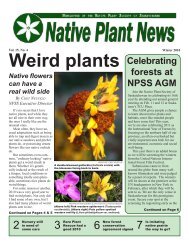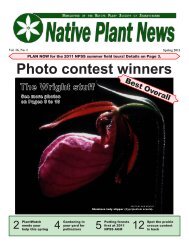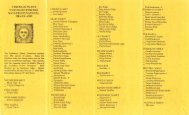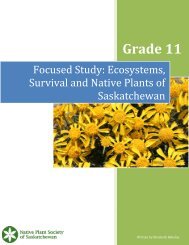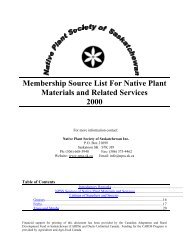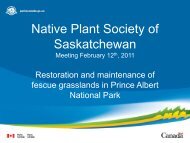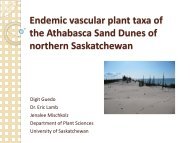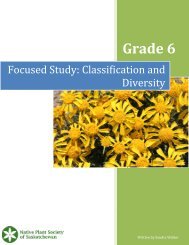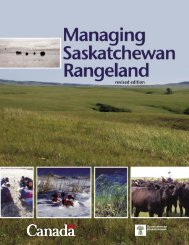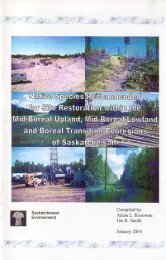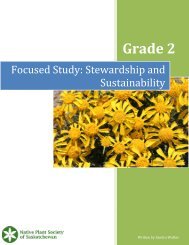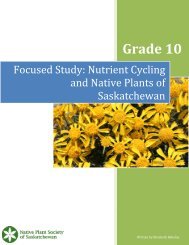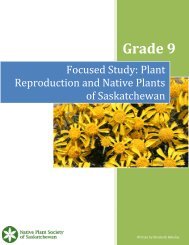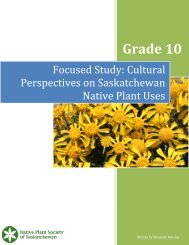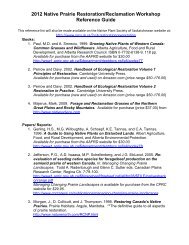Native Plants As Habitat For Wildlife - Native Plant Society of ...
Native Plants As Habitat For Wildlife - Native Plant Society of ...
Native Plants As Habitat For Wildlife - Native Plant Society of ...
You also want an ePaper? Increase the reach of your titles
YUMPU automatically turns print PDFs into web optimized ePapers that Google loves.
In the first study widespread loss <strong>of</strong> Elm trees to Dutch Elm Disease appears to have<br />
resulted in a decline <strong>of</strong> Eastern Screech Owls along the lower Souris River. Two<br />
comprehensive surveys have been conducted along this stretch <strong>of</strong> the river, the first was<br />
conducted in the spring <strong>of</strong> 1986 the second in the spring <strong>of</strong> 1997. Fifteen calling birds<br />
were found along the river in 1986, whereas only four calling birds were heard calling in<br />
1997. The decline <strong>of</strong> the Screech-owl may have been be exacerbated by competition with<br />
increasing number <strong>of</strong> Fox Squirrels in the area. Fox Squirrels actively compete with other<br />
wildlife including Screech-owls for nesting and roosting sites. The provision <strong>of</strong> nest<br />
boxes may, however, help reverse the trend in Screech-Owl populations in the area.<br />
In the other study area bird were surveyed on 36 point counts distributed between the<br />
Alberta border and the old Prelate Ferry northeast <strong>of</strong> Leader. Sample sizes were too small<br />
to yield statistically significant results for some <strong>of</strong> the parameters studied, but were<br />
sufficient to determine the effects <strong>of</strong> moderate grazing on the avifaunal composition.<br />
Three <strong>of</strong> the fifteen most common species, the American Robin, Spotted Towhee and<br />
Western Meadowlark, were significantly more common on grazed than on ungrazed point<br />
counts. On the other hand, no species were found to be negatively affected by moderate<br />
grazing.<br />
The results <strong>of</strong> this study were, for the American Robin, consistent with the majority <strong>of</strong><br />
nine studies <strong>of</strong> the effects <strong>of</strong> cattle grazing in the western United States as reviewed by<br />
Saab et al. (1995). Spotted Towhees may have been more abundant on grazed plots<br />
because moderate grazing promotes the growth <strong>of</strong> shrubbery by reducing competition for<br />
water and nutrients by grasses (Nernberg, pers. Comm., 1999). Meadowlarks are<br />
presumably rarer on ungrazed plots because the grassland areas are <strong>of</strong>ten cultivated.<br />
Anstey et al. (1995) found meadowlarks at less than one fifth the density in cropland<br />
compared to native prairie.<br />
The second study suggests that, in the short term, moderate grazing has no adverse effects<br />
on bird populations in the Leader area. Longer more intensive studies are, however,<br />
needed to determine the effects <strong>of</strong> more intensive grazing on the flora and fauna, as well<br />
as the potential effects <strong>of</strong> even moderate grazing on the regeneration <strong>of</strong> woodlands in the<br />
area.<br />
Literature Cited<br />
Anstey, D. A., S. K. Davis, D. C. Duncan and M. Skeel. 1995. Distribution and habitat<br />
selection <strong>of</strong> eight grassland songbird species in southern Saskatchewan.<br />
Saskatchewan Wetland Conservation Corporation, Regina. 11pp. + Tables.<br />
Bradley, C. 1982. Modified meandering river regimes-Effects on plains cottonwood<br />
regeneration, Milk River Valley, S. E. Alberta, and N. Montana. M. S. Thesis, Dep.<br />
<strong>of</strong> Geog., Univ. <strong>of</strong> Calgary, Alta.<br />
Gregory, S. V., F. J. Swanson, W. A. McKee, and K. W. Cummins. 1991. An ecosystem<br />
perspective <strong>of</strong> riparian zones. Bioscience 41:540-551.<br />
19



